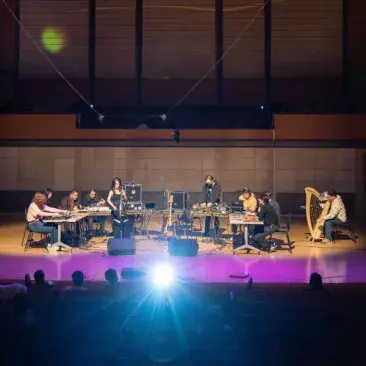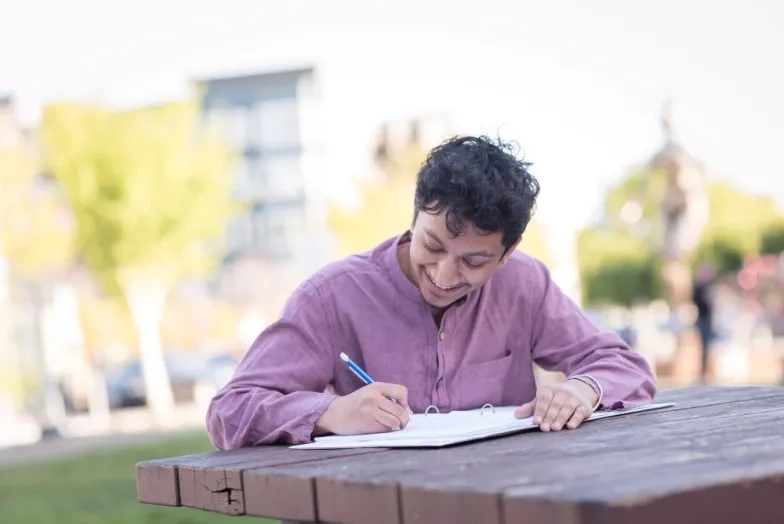Professional Development Grants
Fall 2025 Submissions are Now Open!
Got an idea? Get paid.
If you have an idea for an artistic project or need financial assistance to take part in a unique opportunity, we may be able to help. We want to work with you to get aid in making your ideas a reality. Professional Development Grants will give you the resources you need to start your next initiative.
Schedule a meeting with Dean Klehr ›
Schedule a meeting with Peer Career Advisor Michael ›
Schedule a meeting with Peer Career Advisor Anishka ›
There are three types of Professional Development Grants, each with a different maximum award amount, and slightly different application procedures. You may only submit an application for ONE of the awards.
NOTE: Please have in mind that Students can only apply to one grant per ACADEMIC YEAR.
NOTE: These are reimbursement grants. You must submit receipts for your expenses to be reimbursed up to the amount you were awarded (Tier 1 and Sky Hi awardees receive 50% up front and the balance once receipts are submitted). Receipts will be accepted up to one year from the date you receive your award notification. Projects up to one year in the past from application date are eligible for an award.
Tier 1 Reimbursement Form ›
Tier 2 Reimbursement Form ›
Sky Hi Reimbursement Form ›
| TIER ONE—APPLY | TIER TWO—APPLY | SKY HI AWARD—APPLY | |
|---|---|---|---|
| Deadline(s): | Meet with Dean Klehr by 11/17, 4pm; Application due 11/21, 4pm; Mandatory presentation on 12/2, 9am-1pm—this date and time are not flexible. Please do not apply if you have a conflict. | First-time applicants and returning applicants who did not receive an award: meet with Peer Career Advisor by 11/17, 4pm; Application due 11/21, 4pm. | Meet with Dean Klehr by 11/17, 4pm; Application due 11/21, 4pm. Mandatory presentation on 12/2, 9am-1pm—this date and time are not flexible. Please do not apply if you have a conflict. |
| Description: | Designed to encourage ambitious, creative projects that may or may not include: concert production, an album, outreach, new technologies, staging, multimedia, marketing, etc. | For miscellaneous expenses associated with a career in music, including: travel, audition fees, clothing, performance fees, recording costs, headshots, websites, etc. Equipment that is considered to be standard upkeep (e.g., strings, cases, mallets, most software, etc.) is not eligible | Supports the collaborative creation of new music for performance works including dance, multimedia, performance art, interactive performance, film/video, and other forms. This award is intended to support both the creation of the music and the collaborative process with choreographer or other artist(s). Projects that utilize digital (computer software) workspaces or tools are preferred. |
| Eligibility: | Must be a currently enrolled student at SFCM Not open to previous semester awardees | Must be a currently enrolled student at SFCM Not open to previous semester awardees | Must be a currently enrolled student at SFCM. Not open to previous semester awardees. |
| Award amount: | $1,000 maximum—50% awarded up-front, 50% as reimbursement if/when project is completed within one year of award date | $500 maximum—reimbursement only | $1,000—50% awarded up-front, 50% as reimbursement if/when project is completed within one year of award date |
| Application: | Online, including project details and budget | Online, including project details and budget | Online, including a letter of support from your collaborator, two representative work samples from within the last five years (in audio or video form), project details, and budget. |
| Presentation: | If you pass the first-round screening process, you will make a proposal presentation to the judging committee on 12/2, 9am-1pm—this date and time are not flexible. Please do not apply if you have a conflict. Click here for T1/ Sky Hi presentation guide. | No presentation required | If you pass the first-round screening process, you will make a proposal presentation to the judging committee on 12/2, 9am-1pm—this date and time are not flexible. Please do not apply if you have a conflict. Click here for T1/Sky Hi presentation guide. |
| Evaluation Criteria: |
|
|
|
| Ineligible requests: |
|
| Anything outside the description above. |
| Judging committee: | First round screening by PDEC. Second, final round by arts professionals from outside the SFCM community | SFCM's Faculty Executive Committee | Mix of arts professionals and SFCM faculty |
Examples of Successful PDG Proposals & Budgets:
Previous SkyHi Grant Winners
Connor Johnson (Spring 2025)
Theo Popov (Fall 2024)
Joshua Dix (Fall 2023)
Taylor Barlow (Spring 2022)
Jose Soberanes (Fall 2021)
Ilia Klimenchenko (Spring 2021)
Jenna Flohr (Spring 2021)
Dylan Williams (Fall 2020)
Kristofer Twadell (Spring 2020)


